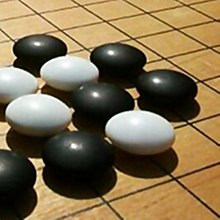
A | B | C | D | E | F | G | H | CH | I | J | K | L | M | N | O | P | Q | R | S | T | U | V | W | X | Y | Z | 0 | 1 | 2 | 3 | 4 | 5 | 6 | 7 | 8 | 9
This article needs additional citations for verification. (November 2018) |
| Part of a series on |
| Go |
|---|
 |
| Game specifics |
|
| History and culture |
| Players and organizations |
| Computers and mathematics |
Players of the game of Go often use jargon to describe situations on the board and surrounding the game. Such technical terms are likely to be encountered in books and articles about Go in English as well as other languages. Many of these terms have been borrowed from Japanese, mostly when no short equivalent English term could be found. This article gives an overview of the most important terms.
Use of Japanese terms
Although Go originated in China, the current English and Western technical vocabulary borrows a high proportion of terms from the Japanese language because it was through Japan that the West was introduced to Go.
Many of these terms are from a jargon used for technical Go writing and are to some extent specially developed for Go journalism. Some authors of English-language Go materials avoid use of Japanese technical terms, and the way they are applied can differ in subtle ways from the original meanings.
A few Korean-language terms have come into use (e.g., haengma as a way of describing the development of stones).[1][2]
Terms
Aji
|
| |||||||||||||||||||||||||||||||||||||||||||||||||||||||||||||||||||||||||||||
| The aji of the triangled stone enables White to escape. |
Aji (Japanese: 味, Chinese: 味道; pinyin: wèi dào; Wade–Giles: wei4 tao4, Korean 맛) meaning 'taste' refers to the latent potential of stones to open various avenues of play. The aji in various positions on the board impacts the course of the game regardless of whether a player makes moves to realize the latent potential. A situation is said to contain bad aji when the presence of the opponent's stones or weaknesses in one's own position create a threat of compromising the position at an opportune moment in the game. It can be very difficult for players to assess the best moment to play a move to realize the potential of aji in a position or to remove the threat of bad aji in one's own position.
In the diagram, the triangled stone is dead, and the three squared white stones appears to be trapped. However, the aji of the triangled stone enables White to escape by jumping to White 1. If black resists, the two black stones can be captured with the help of the triangled stone.[3]
Atari
|
| |||||||||||||||||||||||||||||||||||||||||||||||||||||||||||||||||||||||||||||||||
| The triangled stones are in atari. |
Atari (当たり) is a term for a situation where a stone or group of stones has only one liberty and may be captured on the next move if unable to attain additional liberties. A group in such a situation is said to be in atari or under atari. Beginners often verbally call out "atari" in a manner similar to calling out "check" in chess, but it is considered inappropriate for more advanced players.[4] In the illustration, the triangled white stones are said to be in atari, because black can capture them in a single move. If black plays a move at a, the white pieces are immediately captured and removed from the board.
In Japanese, atari (Japanese: 当たり, あたり, or アタリ) is the nominalized form of ataru (当たる, あたる, or アタル), meaning 'to hit the target' or 'to receive something fortuitously'. The word atari is used in Japanese when a prediction comes true or when someone wins a lottery. In Chinese ta chi'ih (Chinese: 打, 打吃 or 叫吃; pinyin: dǎ, dǎ chī or jiào chī; Wade–Giles: ta3, ta3 ch'ih1 or chiao4 ch'ih1); Korean: dansu (단수).
